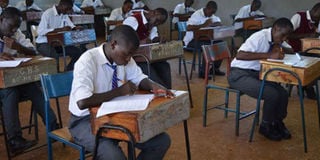Massive training for players in curriculum review

Chavakali High School candidates sit for their Kenya Certificate of Secondary Education (KCSE) examination on October 19, 2015. PHOTO | ISAAC WALE | NATION MEDIA GROUP
What you need to know:
- On Thursday, regional directors of Education and school heads will meet at the Kenya Institute of Curriculum Development (KICD) for a one day induction seminar.
- The pilot is a major step in the adaptation of the new curriculum, which seeks to radically change the country’s education system in more than 30 years as it replaced the disgraced 8-4-4.
Multi-sectorial players in the curriculum review process have been lined up for massive training ahead of its piloting next month.
On Wednesday, the Teachers Service Commission (TSC), Kenya Education Management Institute (Kemi) and Kenya National Examination Council (Knec) among other institutions will be in Naivasha for training on the review process.
On Thursday, regional directors of Education and school heads will meet at the Kenya Institute of Curriculum Development (KICD) for a one day induction seminar.
“The seminar is to induct the head teachers of 470 pilot selected schools in 47 counties on the pilot programme for early year education,” said KICD Director Julius Jwan in an invitation to the stakeholders.
Also set to undergo training are quality assurance officer, curriculum support officers, teachers and learners directly involved in the implementation of the curriculum.
Other stakeholders include parents and school Boards of Management (BOM) and the participants will be engaged throughout the pilot session.
“They will be required to provide extensive and honest feedback as part of the monitoring and evaluation process. Emphasizing the need for their feedback is critical to the development and improvement of the competence based curriculum.
“They finally will complete written-evaluation forms and participate in discussions on the implementation experience,” states a report on piloting by KICD.
The piloting will be carried out at pre-primary and lower primary levels, referred to as “early years” before rollout in January.
The new system has three tiers: Early years, consisting of Pre-primary One to Grade Three; middle-school, comprising Grades Four to Nine; and senior school, running from Grade 10 to 12.
The pilot is a major step in the adaptation of the new curriculum, which seeks to radically change the country’s education system in more than 30 years as it replaced the disgraced 8-4-4.
It aims at testing the feasibility and validity of the new curriculum that shifts learning from mere memory and recitation of facts to application of knowledge and skills.
The new curriculum seeks to equip learners with seven key skills: Communication and collaboration; self-efficacy; critical thinking and problem solving; creativity and imagination; citizenship; digital literacy; and learning to learn.





